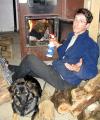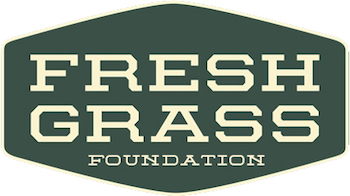I and My Chimney
Herman Melville wrote a short story called “I and My Chimney” about an old codger’s love affair with his big, smoky, stone chimney. I wasn’t thinking of that story when I shared my experience of a chimney fire in my recent appeal to Folk Alley listeners, but the response from chimney-wise folk fans reminds me of that old grade-school reading assignment. Melville understood, in a way that few of us do in this time of central heating, the powerful bond that exists between a cabin dweller and the health of his chimney. And the consequences that can result from benign neglect. Here are some of the notes I’ve received from experienced fire-tenders:
 |
| Jim applies the miracle creosote spray to avoid another disaster |
![]() Your story brings back my brush with burning my house down. Man how those chimney fires roar and howl! Scares the bejesus out of a soul! – Brooks Jones
Your story brings back my brush with burning my house down. Man how those chimney fires roar and howl! Scares the bejesus out of a soul! – Brooks Jones
![]() Never, never, never pour water into a chimney fire. The sudden change in temperature will surely cause the brick to crack and even collapse. Back on the farm in Manitoba if we ever had a fire in the chimney, my mother or dad, whom ever was around, poured salt down the chimney. Fortunately, we only had one fire in my life time. Good dry wood and a hot fire is the best preventative. – Al Procyshyn, Revelstoke, BC
Never, never, never pour water into a chimney fire. The sudden change in temperature will surely cause the brick to crack and even collapse. Back on the farm in Manitoba if we ever had a fire in the chimney, my mother or dad, whom ever was around, poured salt down the chimney. Fortunately, we only had one fire in my life time. Good dry wood and a hot fire is the best preventative. – Al Procyshyn, Revelstoke, BC
![]() We live in Phoenix, so the whole “heating ” thing is kind of alien to us.- Neil Urban
We live in Phoenix, so the whole “heating ” thing is kind of alien to us.- Neil Urban
![]() You are never to use water to put out a chimney fire ( it will ruin your pipe and stove ) – use baking soda or sand and smother the fire and if you think you need to put it out in the chimney just close it up on top ( put a bucket over it ( metal of course )) and do just as you did below cut off all air. – Teresa Vitale
You are never to use water to put out a chimney fire ( it will ruin your pipe and stove ) – use baking soda or sand and smother the fire and if you think you need to put it out in the chimney just close it up on top ( put a bucket over it ( metal of course )) and do just as you did below cut off all air. – Teresa Vitale
![]() Thanks for reminding me about chimney cleaning. – Marty Bradbury
Thanks for reminding me about chimney cleaning. – Marty Bradbury
![]() A chimney fire is a great, if potentially dangerous, way of cleaning your flue of creosote buildup.
A chimney fire is a great, if potentially dangerous, way of cleaning your flue of creosote buildup.
– Dave Cook
![]() Here in Germany we have frequent controls from the district chimney-sweeper in order to prevent such adventures – seems to be a real outback where you live – the old pioneer days.
Here in Germany we have frequent controls from the district chimney-sweeper in order to prevent such adventures – seems to be a real outback where you live – the old pioneer days.
– Ingo Rasch, Wuppertal, Germany
And speaking of Melville and past English assignments, this note from retired English teacher Harlan Underhill in Ann Arbor, Michigan correcting my admonition that “The next day I cleaned out the chimney and the stove pipe as I should of BEFORE I lit my first fire of the season.” Harlan reminds me that ” either ‘should’ve’ or ‘should have’ ” is the proper usage.
Thanks for the advice, and thanks for your contributions. Your support keeps the fires burning at Folk Alley. – Jim




